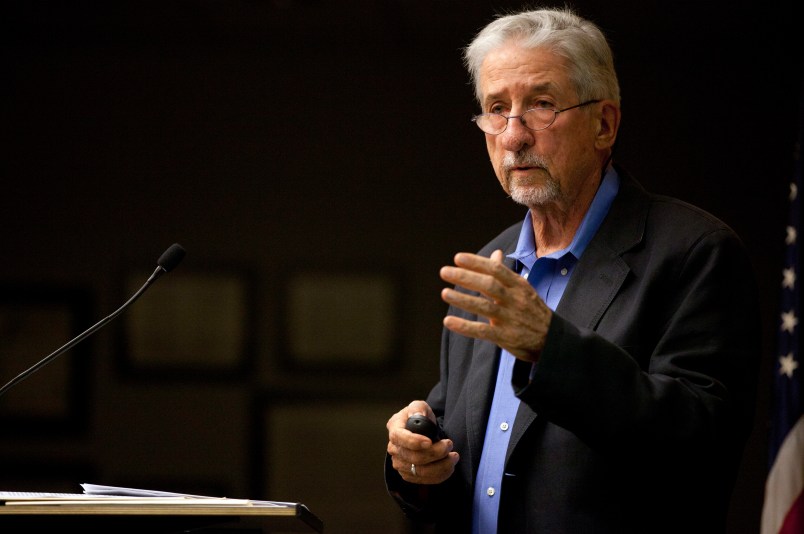SANTA MONICA, Calif. (AP) — Famed ’60s anti-war activist Tom Hayden, whose name became forever linked with the celebrated Chicago 7 trial, Vietnam War protests and his ex-wife actress Jane Fonda, has died. He was 76.
Hayden, once denounced as a traitor by his detractors, overcame his past and won election to the California Assembly and Senate where he served for almost two decades as a progressive force on such issues as the environment and education. He was the only one of the radical Chicago 7 defendants to win such distinction in the mainstream political world.
He remained an enduring voice against war and spent his later years as a prolific writer and lecturer advocating for reform of America’s political institutions.
Los Angeles Mayor Eric Garcetti praised Hayden. “A political giant and dear friend has passed. Tom Hayden fought harder for what he believed than just about anyone I have known. RIP, Tom,” Garcetti said Sunday night on his Twitter account.
Hayden wrote or edited 19 books, including “Reunion,” a memoir of his path to protest and a rumination on the political upheavals of the ’60s.
“Rarely, if ever, in American history has a generation begun with higher ideals and experienced greater trauma than those who lived fully the short time from 1960 to 1968,” he wrote.
Hayden was there at the start. In 1960, while a student at the University of Michigan at Ann Arbor, he was involved in the formation of Students for a Democratic Society (SDS), then dedicated to desegregating the South. By 1962, when he began drafting the landmark Port Huron Statement, SDS and Hayden were dedicated to changing the world.
Hayden was fond of comparing the student movement that followed to the American Revolution and the Civil War.
In 1968, he helped organize anti-war demonstrations during the Democratic National Convention in Chicago that turned violent and resulted in the notorious Chicago 7 trial. It began as the Chicago 8 trial, but one defendant, Bobby Seale, was denied the lawyer of his choice, was bound and gagged by the judge and ultimately received a separate trial.
After a circus-like trial, Hayden and three others were convicted of crossing state lines to incite riot. The convictions were later overturned, and an official report deemed the violence “a police riot.”
Thomas Emmet Hayden was born Dec. 11, 1939, in Royal Oak, Michigan, to middle-class parents. At Michigan, he took up political causes including the civil rights movement. He wrote fiery editorials for the campus newspaper and contemplated a career in journalism. But upon graduation, he turned down a newspaper job. As he wrote in his memoir, “I didn’t want to report on the world; I wanted to change it.”
He joined the fledgling Student Non-Violent Coordinating Committee, went freedom-riding during civil rights protests in the South and was beaten and briefly jailed in Mississippi and Georgia. He married a fellow activist, Sandra “Casey” Cason.
Yearning for a more influential role, Hayden returned to Ann Arbor, where he was enlisted by the SDS to draft the Port Huron Statement, a call to action he hoped would spread to the rest of the country.
In 1965, Hayden made his first visit to North Vietnam with an unauthorized delegation. In 1967, he returned to Hanoi with another group and was asked by North Vietnamese leaders to bring three prisoners of war back to the United States.
Firmly committed to the anti-war movement, Hayden participated in sit-ins at Columbia University, then began traveling the country to promote a rally in Chicago for the 1968 Democratic National Convention.
In the interim, a single event galvanized him — the 1968 assassination of his friend, Sen. Robert F. Kennedy, in Los Angeles. “I went from Robert Kennedy’s coffin into a very bleak and bitter political view,” Hayden told the Associated Press in 1988.
In 1971, Hayden met Jane Fonda, a latecomer to the protest movement. After he heard her give an eloquent anti-war speech in 1972, Hayden said they connected and became a couple. He was divorced from Cason. Fonda was divorced from director Roger Vadim and had a daughter, Vanessa Vadim.
Hayden and Fonda were married for 17 years and had a son, Troy.
With heavy financial support from Fonda, Hayden plunged into California politics in the late 1970s. He formed the Campaign for Economic Democracy and was elected to the Assembly in 1982.
In 1992, Hayden won election to the state Senate advocating for environmental and educational issues. By then, he and Fonda were divorced.
Hayden went on to marry actress Barbara Williams, and they had a son, Liam.
In 1994, Hayden was defeated in a run for the state governorship, and he lost a bid to become mayor of Los Angeles.
After leaving public office, Hayden wrote and traveled extensively, lecturing, teaching and speaking out against the wars in Iraq and Afghanistan. He was also an advocate for animals, and in 2012 he lobbied Gov. Jerry Brown to preserve a piece of legislation known as Hayden’s Law, which he had authored to protect shelter animals from premature euthanasia.
Copyright 2016 The Associated Press. All rights reserved. This material may not be published, broadcast, rewritten or redistributed.







America today needs Tom Hayden’s by the hundreds of thousands. Most people who did not know him will never realize how much America has lost with the passing of the original.
A real loss and one that makes me feel particularly old today
I guess I am officially ‘old’. Rest in peace, Tom.
Tom Hayden was one of those smart white middle class young Americans who demonstrated for me what Bobby Kennedy was talking about - the burden and obligation to step forward and build a better more equal America. He had a lot of fight in him, and a big heart.
I can’t emphasize enough how much influence the Port Huron Statement had on an entire generation of activists.
Tom Hayden, we will miss you. You were a true leader.